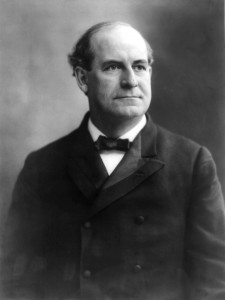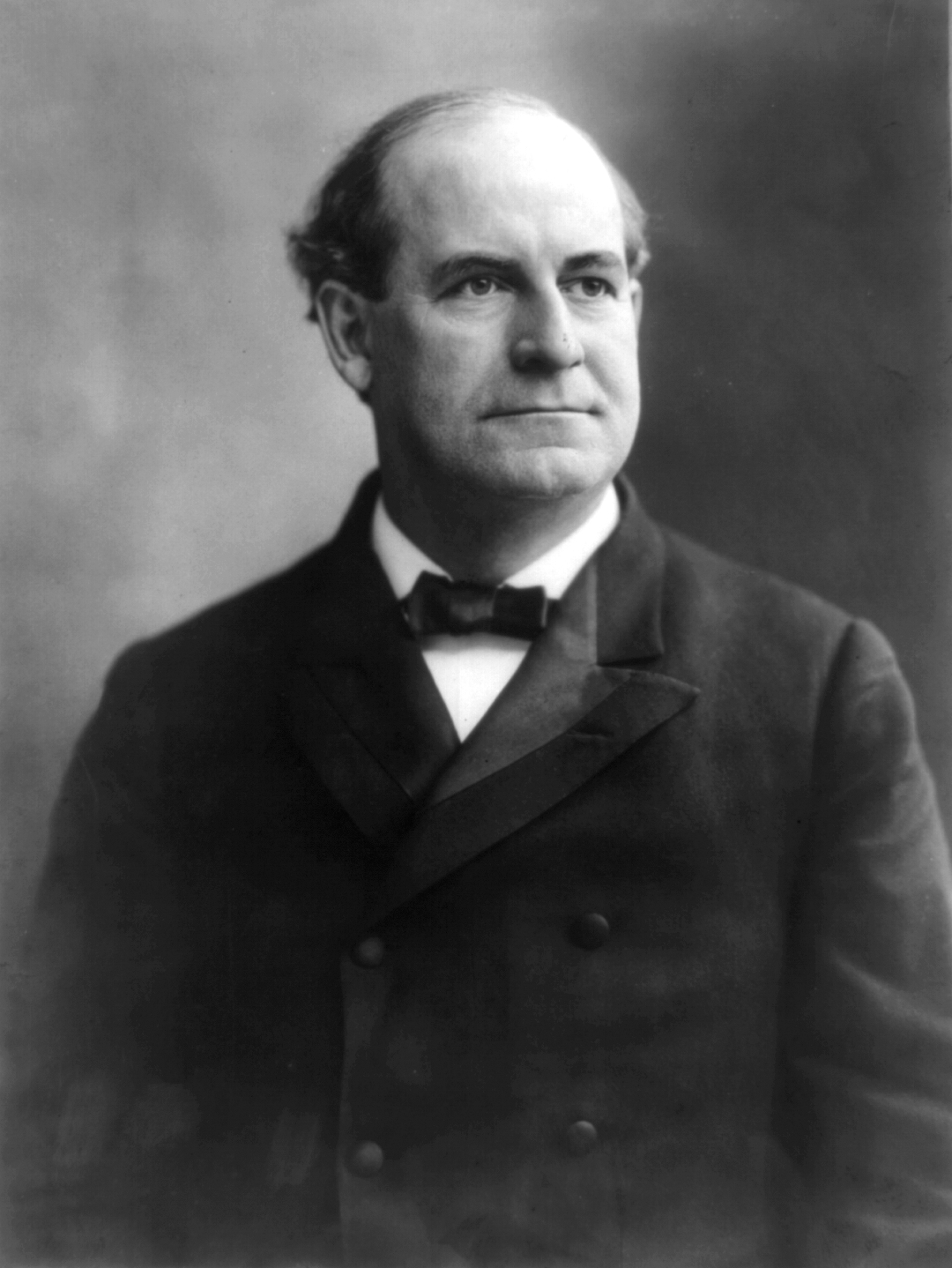Despite decades of instruction (some would say “indoctrination”) in America’s government-run schools, a sizable percentage of the population is still skeptical of Darwin’s Theory of Evolution, the idea that over billions of years randomly combining chemicals eventuated in non-randomly combining chemists (in brief, “molecules to man”).

Problematic Populist politician and erstwhile presidential candidate William Jennings Bryan (1860-1925) sincerely felt that the Darwin Theory constituted an actual threat to the internal security of the United States, and he urged state and local officials to ban its teaching. Bryan (who, if you didn’t already know, was satirized by L. Frank Baum as the Cowardly Lion in The Wizard of Oz) would die a few days after the infamous Scopes “Monkey Trial” in Tennessee, much maligned by his enemies (H. L. Mencken reportedly exulting in his death). (For more about Bryan, see this article.)
Here below we have in a nutshell Bryan’s objections to Darwinism; what is remarkable about them is how “modern” they sound. Adherents to Christianity who accept the Bible account of creation (Bryan, interestingly enough, didn’t completely believe it) still find validity in his argument that Darwinists hope to escape “from the miracle [of creation]” and that “we shall lose the consciousness of God’s presence in our daily life” as a result of the theory. Bryan also criticizes the notion that “the first germ of life came from another planet” (as the rabid anti-theist Richard Dawkins suggested to Ben Stein a few years ago) as well as spontaneous generation (non-life somehow producing life). Bryan also objected to the Darwin Theory because of its insistence on “survival of the fittest” (what he calls “the law of hate”) driving countries to justify warfare with each other, presenting the bleak prospect “that through all the ages no spiritual force has touched the life of man or shaped the destiny of nations.”
~ ~ ~
MR. BRYAN’S OBJECTION TO DARWINISM
The Literary Digest, December 11, 1909
IN the year of Darwin’s centenary, one prominent platform speaker has put into printed form his oft-repeated declaration that he does not accept the Darwinian theory. William J. Bryan is the man referred to, and his statement of the case, included in a volume of his recently published speeches, “revised and arranged by himself,” occurs in the address called “The Prince of Peace,” delivered at many Chautauquas and religious gatherings in America, beginning in 1904; also in Canada, Mexico, Tokyo, Manila, Bombay, Cairo, and Jerusalem. Mr. Bryan refuses to accept the theory, he says, because “it does not solve the mystery of life or explain human progress.” Some, he fears, have accepted it “in the hope of escaping from the miracle,” but why, he asks, “should the miracle frighten us?” Mr. Bryan does not “mean to find fault” with any one who wishes to accept the theory.
“All I mean to say is,” he declares, “that while you may trace your ancestry back to the monkey if you find pleasure or pride in doing so, you shall not connect me with your family tree without more evidence than has yet been produced.” He goes on:
“I object to the theory for several reasons. First, it is a dangerous theory. If a man links himself in generations with the monkey, it then becomes an important question whether he is going toward him or coming from him—and I have seen them going in both directions. I do not know of any argument that can be used to prove that man is an improved monkey that may not be used just as well to prove that the monkey is a degenerate man, and the latter theory is more plausible than the former.
“It is true that man, in some physical characteristics, resembles the beast, but man has a mind as well as a body, and a soul as well as a mind. The mind is greater than the body and the soul is greater than the mind, and I object to having man’s pedigree traced on one-third of him only—and that the lowest third. Fairbairn, in his ‘Philosophy of Christianity’ [sic], lays down a sound proposition when he says that it is not sufficient to explain man as an animal; that it is necessary to explain man in history—and the Darwinian theory does not do this. The ape, according to this theory, is older than man, and yet the ape is still an ape while man is the author of the marvelous civilization which we see about us.
“One does not escape from mystery, however, by accepting this theory, for it does not explain the origin of life. When the follower of Darwin has traced the germ of life back to the lowest form in which it appears—and to follow him one must exercise more faith than religion calls for—he finds that scientists differ. Those who reject the idea of creation are divided into two schools, some believing that the first germ of life came from another planet and others holding that it was the result of spontaneous generation. Each school answers the arguments advanced by the other, and as they can not agree with each other, I am not compelled to agree with either.”
If compelled to accept one of these theories, Mr. Bryan would prefer the first, he says; adding, “for if we can chase the germ of life off this planet and get it out into space, we can guess the rest of the way and no one can contradict us, but if we accept the doctrine of spontaneous generation, we can not explain why spontaneous generation ceased to act after the first germ was created.” We read further:
“Go back as far as we may, we can not escape from the creative act, and it is just as easy for me to believe that God created man as he is as to believe that, millions of years ago, he created a germ of life and endowed it with power to develop into all that we see to-day. I object to the Darwinian theory, until more conclusive proof is produced, because I fear we shall lose the consciousness of God’s presence in our daily life, if we must accept the theory that through all the ages no spiritual force has touched the life of man or shaped the destiny of nations.
“But there is another objection. The Darwinian theory represents man as reaching his present perfection by the operation of the law of hate—the merciless law by which the strong crowd out and kill off the weak. If this is the law of our development then, if there is any logic that can bind the human mind, we shall turn backward toward the beast in proportion as we substitute the law of love. I prefer to believe that love rather than hatred is the law of development. How can hatred be the law of development when nations have advanced in proportion as they have departed from that law and adopted the law of love?”

